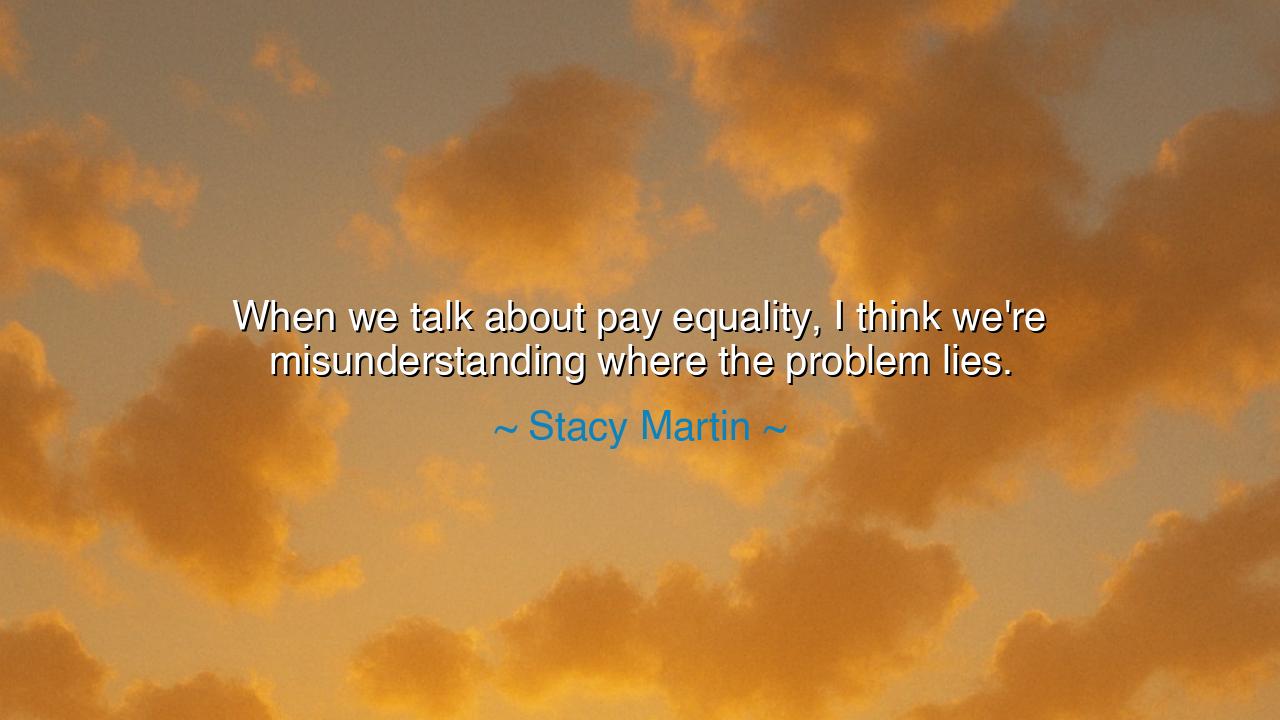
When we talk about pay equality, I think we're misunderstanding
When we talk about pay equality, I think we're misunderstanding where the problem lies.






“When we talk about pay equality, I think we’re misunderstanding where the problem lies.” — So spoke Stacy Martin, with the calm insight of one who looks beneath the surface of things, to the hidden roots where the true sickness dwells. Her words are not a denial of injustice, but a revelation: that the battle for fairness is not merely waged in salaries and contracts, but in the deep, unseen currents of value, power, and perception that shape the world. Many cry for equal pay, yet few ask the more dangerous question — why do we not value all labor, all voices, all forms of contribution equally to begin with?
The ancients taught that a society’s soul is revealed not by its laws, but by what it chooses to honor. In the days of Athens, the philosopher Diotima once challenged her students: “Do you love wisdom itself, or merely the glory it brings?” So too must we ask of ourselves — do we seek pay equality as a symbol, or do we seek the transformation of the spirit that undervalues women, minorities, and the gentle work of care and creation? The problem, as Martin warns, lies not in the numbers on a ledger, but in the structures of worth that those numbers reflect.
Consider the story of Ada Lovelace, the first computer programmer, who lived in an age when women’s intellect was a curiosity, not a crown. Her visionary writings laid the foundation for a revolution — the birth of computing itself — yet for decades her name was forgotten while men were hailed as inventors of what she had already foreseen. Ada did not need a higher wage; she needed a world that could recognize her genius as equal in value to any man’s. Her silence across history is not a result of poor pay, but of systemic blindness — a refusal to see the power in what society calls “other.”
To speak of pay equality, then, is to speak of symptoms. The disease lies in culture, in how we define success, authority, and talent. Why is it that certain professions — teaching, nursing, caregiving — are paid less, even though they sustain the very heart of civilization? It is because we still assign greater value to conquest than to compassion, to profit than to nurture. The problem lies not in the marketplace, but in the mirror. Until hearts change, laws alone cannot heal what pride and prejudice have written into our collective soul.
Martin’s insight is not despairing; it is a call to wisdom. She asks us to look beyond the outer debate, to the inner architecture of inequality. If a garden withers, we do not polish its leaves — we tend to its roots. So must we tend to the roots of our institutions, our schools, our homes, and the stories we tell our children about worth. If we tell our daughters that they may lead, and our sons that they may feel, if we celebrate both strength and tenderness alike, then we will begin to shift the foundation upon which equality must stand.
Let us learn, too, from Malala Yousafzai, who fought not for higher pay, but for the right to learn — knowing that without education, there can be no equality, only dependency disguised as peace. Her courage reminds us that true equality begins with empowerment, not mere compensation. For when minds are awakened and voices are heard, the scales of justice begin to balance themselves. The coin is not the prize — it is the recognition of humanity’s shared dignity that truly matters.
So hear this lesson, O seeker of justice: Do not measure fairness by gold alone. Pay equality is a noble aim, but it is the fruit, not the seed. If you wish to see a world made whole, cultivate the soil of respect, empathy, and awareness. Challenge not only the systems that count wages, but the thoughts that count worth. Teach those around you — through word and action — that every labor, whether of hand or heart, bears divine value.
And thus remember: the greatest revolution is not fought in parliament or boardroom, but within the conscience of humankind. When each of us begins to honor the unseen, the undervalued, and the unheard, the problem will no longer be misunderstood — it will be conquered. For then equality will no longer need to be demanded; it will simply be.






AAdministratorAdministrator
Welcome, honored guests. Please leave a comment, we will respond soon